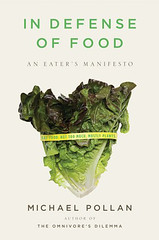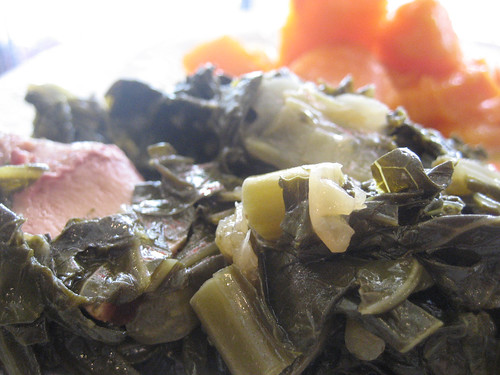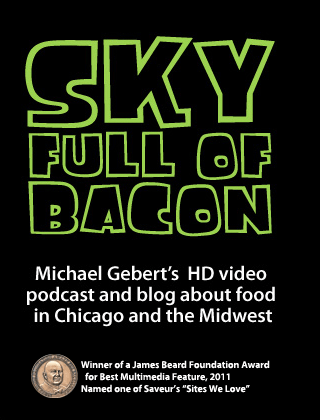
When I saw the title In Defense of Food, my first thought was that the thing food most needs defending against at the moment is Michael Pollan. His The Omnivore’s Dilemma was the feel-bad food book of the last few years, telling us everything that’s messed-up about our industrialized food-producing system. I have no doubt that it’s fine reporting and largely true, but I just couldn’t bring myself to read several hundred pages of that— and I have a certain conviction, deep down, that there is a portion of the populace which feels guilty about our comfy lifestyle and likes to read that things are irredeemably doomed and our punishment is on its way. (An Inconvenient Truth is the ultimate such hairshirt book; so are all those Oprah books about how your childhood scarred you forever. Again, it’s not that there may not be a lot of merit in their arguments, but people also read them to wallow in gloom.)
If Omnivore was Old Testament judgment and wrath, though, In Defense seems to be New Testament hope and practical advice for living the go-forth-and-sin-no-more lifestyle. As Pollan, downright cheerily, says at the end of the foreword, “I doubt the last third of the book could have been written forty years ago, if only because there would have been no way to eat the way I propose without going back to the land… Eaters have real choices now.” Basically his argument— and who can argue with it?— is that food is getting ever more unnatural, we shop for nutrients and numbers (fat grams, RDAs, etc.) rather than actual food, and yet we’re fatter and more prone to diseases of affluence than ever, so if we just stop shopping for weird fakey stuff because it promises the magic bullet of the moment and simply hunt for and gather real, whole foods, we’ll be better off.
As it happens— and this is why I am writing about a book after having read only its foreword— just as I was leafing through the book, my own folly had put in front of me a perfect example of, in Pollan’s words, an edible foodlike substance. After the bookstore I took the kids to the adjacent Panera, where they like the bagels (no, you may not have chocolate chip, you may have Plain), and I should have ordered either the Asiago roast beef sandwich, which is decent, damn the cholesterol, or the Mediterranean salad, which is gooped up a little, but still might actually have some tiny resemblance to the Mediterranean diet.
Foolishly, though, I tried to square the difference by getting a healthier™ chicken sandwich, and found myself ordering something bearing the ghastly neologism Frontega Chicken (its daddy was Frontera Grill, its mama was a Chevy Vega, I guess), simply because it didn’t have bacon in it like nearly everything else (except the chocolate chip bagels).
This proved to be some sort of unnaturally smoked chicken, engoobed in a lucite-like preservative of melted cheese-like substance, warmed-to-mush tomatoes and panini’d-to-crunchy bread, which recalled nothing so much as a brand of microwavable sandwiches I used to take to high school lunch once upon a time, which contained some sort of Soyuz-program cheese goop that would ooze out of the crustily-warmed sandwich like a coolant leak. Like the cheese, my skepticism about Pollan’s message melted away as I ate the minimum necessary to stave off hunger and wrapped the rest to take home, to spend its obligatory leftover waiting period in the fridge before being disposed of guilt-free. The book, on the other hand, will be consumed in its entirety.



 Posted in
Posted in 





